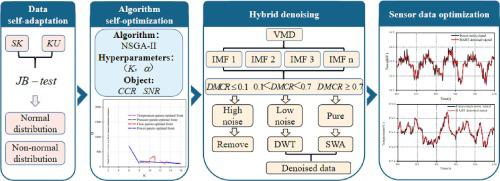当前位置:
X-MOL 学术
›
Nucl. Eng. Des.
›
论文详情
Our official English website, www.x-mol.net, welcomes your feedback! (Note: you will need to create a separate account there.)
Research on sensor data optimization technology for thermal hydraulic experiment of nuclear reactor
Nuclear Engineering and Design ( IF 1.7 ) Pub Date : 2024-04-01 , DOI: 10.1016/j.nucengdes.2024.113176 Liu Yongchao , Li Tong , Xiao Kai , Chen Jie , Tan Xin , Cheng Jiahao , Tan Sichao , Wang Bo , He Zhengxi , Shen Jihong , Gao Puzhen , Tian Ruifeng
Nuclear Engineering and Design ( IF 1.7 ) Pub Date : 2024-04-01 , DOI: 10.1016/j.nucengdes.2024.113176 Liu Yongchao , Li Tong , Xiao Kai , Chen Jie , Tan Xin , Cheng Jiahao , Tan Sichao , Wang Bo , He Zhengxi , Shen Jihong , Gao Puzhen , Tian Ruifeng

|
The sensor signals collected by the nuclear reactor thermal hydraulic experimental system are mixed with complex noise information. The uncertainty of sensor data directly affects the analysis and evaluation effect of machine learning algorithms on the operating status of the experimental system. Traditional denoising methods have poor adaptability to different types of noisy data, are highly dependent on researchers and have high design cost. This paper proposes a data optimization technology based on a hybrid adaptive real-time denoising (HART) model, which can realize data distribution self-adaptation and algorithm hyperparameter self-optimization according to the characteristics of noisy source data. Through the joint denoising algorithm with Variational Mode Decomposition (VMD) algorithm as the core, the partition denoising of source data is realized. In addition, the practical application of the source data of thermal hydraulic experiments in the nuclear field and the verification of simulation and noise addition experiments have been completed. The results show that the denoising optimization model proposed in this paper has the characteristics of good adaptability, self-optimization and real-time processing for different sensor signals. It can effectively remove noise information, restrain data uncertainty, and provide high-quality data source for experimental data analysis based on machine learning. At the same time, the optimization technology can be further applied to the optimization of sensor data of nuclear power plants (NPP).
中文翻译:

核反应堆热工水力实验传感器数据优化技术研究
核反应堆热工水力实验系统采集的传感器信号中混有复杂的噪声信息。传感器数据的不确定性直接影响机器学习算法对实验系统运行状态的分析和评估效果。传统的去噪方法对不同类型的噪声数据适应性差,对研究人员依赖性强,设计成本较高。本文提出一种基于混合自适应实时降噪(HART)模型的数据优化技术,能够根据含噪源数据的特点实现数据分布自适应和算法超参数自优化。通过以变分模态分解(VMD)算法为核心的联合去噪算法,实现源数据的分区去噪。此外,还完成了核领域热工水力实验源数据的实际应用以及模拟和噪声添加实验的验证。结果表明,本文提出的去噪优化模型对于不同的传感器信号具有良好的适应性、自优化和实时处理的特点。能够有效去除噪声信息,抑制数据不确定性,为基于机器学习的实验数据分析提供高质量的数据源。同时,该优化技术还可进一步应用于核电站(NPP)传感器数据的优化。
更新日期:2024-04-01
中文翻译:

核反应堆热工水力实验传感器数据优化技术研究
核反应堆热工水力实验系统采集的传感器信号中混有复杂的噪声信息。传感器数据的不确定性直接影响机器学习算法对实验系统运行状态的分析和评估效果。传统的去噪方法对不同类型的噪声数据适应性差,对研究人员依赖性强,设计成本较高。本文提出一种基于混合自适应实时降噪(HART)模型的数据优化技术,能够根据含噪源数据的特点实现数据分布自适应和算法超参数自优化。通过以变分模态分解(VMD)算法为核心的联合去噪算法,实现源数据的分区去噪。此外,还完成了核领域热工水力实验源数据的实际应用以及模拟和噪声添加实验的验证。结果表明,本文提出的去噪优化模型对于不同的传感器信号具有良好的适应性、自优化和实时处理的特点。能够有效去除噪声信息,抑制数据不确定性,为基于机器学习的实验数据分析提供高质量的数据源。同时,该优化技术还可进一步应用于核电站(NPP)传感器数据的优化。



























 京公网安备 11010802027423号
京公网安备 11010802027423号